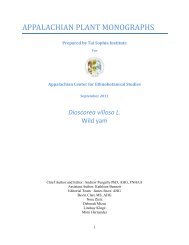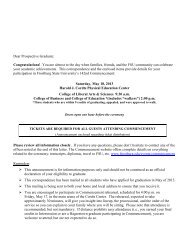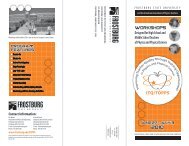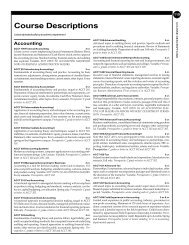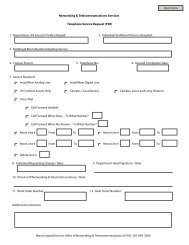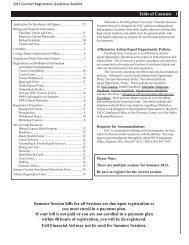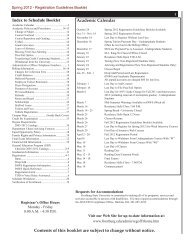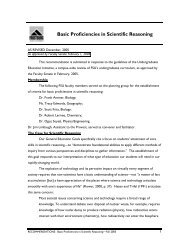GEOG 403: Geography of Sub-Saharan Africa
GEOG 403: Geography of Sub-Saharan Africa
GEOG 403: Geography of Sub-Saharan Africa
You also want an ePaper? Increase the reach of your titles
YUMPU automatically turns print PDFs into web optimized ePapers that Google loves.
Instructor: Dr. James C. Saku<br />
Office Phone: 301-687-4724, Secretary: 301-687-4369<br />
Office Location: GU 232<br />
Office Hours: 2:00-3:00 pm MW, 8:00-8:50 am W, 9:30-10:30 am TR or by<br />
appointment<br />
Lecture Hours: TR 8:00 am - 9.15 am<br />
Email: jsaku@frostburg.edu.<br />
Course Description<br />
The cultural, economic, physical, and political potentials <strong>of</strong> sub-Sahara <strong>Africa</strong>. The<br />
complex spatial patterns that define the <strong>Sub</strong>-Sahara <strong>Africa</strong>n landscape are examined.<br />
Course Objectives<br />
1. The course provides an understanding to the spatial patterns <strong>of</strong> the social, cultural,<br />
political and economic processes in <strong>Sub</strong>-Sahara <strong>Africa</strong>.<br />
2. Examines the problems and prospects <strong>of</strong> development in the sub-region by<br />
investigating the intra-regional factors affecting the continent's development.<br />
3. Investigate the colonial influences on the development dilemma <strong>of</strong> the region.<br />
4. Examine the opportunities and constraints <strong>of</strong> the physical environment to <strong>Sub</strong>-Sahara<br />
<strong>Africa</strong>n development.<br />
5. Analyze contemporary global political economy on <strong>Africa</strong>n development efforts.<br />
6. Explore the measures <strong>of</strong> promoting regional economic development<br />
Learning Objectives<br />
1. Students should be able to understand the physical landscape <strong>of</strong> sub-Sahara <strong>Africa</strong>.<br />
2. By the end <strong>of</strong> the class, students should be able to demonstrate their knowledge <strong>of</strong> the<br />
complex cultural, economic and political systems <strong>of</strong> sub-Sahara <strong>Africa</strong>.<br />
3. Students should be capable <strong>of</strong> writing a paper on sub-Sahara <strong>Africa</strong>.<br />
4. Students should demonstrate an understanding <strong>of</strong> the location <strong>of</strong> important geographic<br />
features in sub-Sahara <strong>Africa</strong>.<br />
5. Students will demonstrate their understanding <strong>of</strong> contemporary issues facing sub-<br />
Sahara <strong>Africa</strong>.<br />
Required Text<br />
1. Aryeetey-Attoh, S. (2010) <strong>Geography</strong> <strong>of</strong> <strong>Sub</strong>-<strong>Saharan</strong> <strong>Africa</strong>. Upper Saddle<br />
River, NJ: Prentice Hall.<br />
Academic Dishonesty<br />
1
Note that academic dishonesty including plagiarism and cheating during examination is a<br />
serious <strong>of</strong>fense and carries severe penalty. Refer to the Pathfinder for details.<br />
Disruptive Student Behavior<br />
Please refer to Pathfinder for details.<br />
Blackboard<br />
To facilitate effective communication between the instructor and students, the course is<br />
available on Blackboard site. You are required to visit the site frequently to check on<br />
announcements and deadlines. Course outlines and assignments are also posted on the<br />
site. You can also check your grades and current average from the grade book.<br />
Policy<br />
Students are expected to attend classes regularly and participate actively during class<br />
discussions. To participate actively in class, students are required to read assigned<br />
materials on the course outline prior to class. Attendance will be recorded and failure to<br />
attend classes will result in loss <strong>of</strong> marks. Your attendance grade will be based on the<br />
total number <strong>of</strong> days present over the expected number <strong>of</strong> days multiplied by 20. For<br />
example, if you were required to be in class for 24 days in the semester, and you were<br />
present for 24 days, your attendance grade will be (24/24)x20 = 20 points. Students are<br />
responsible for informing the instructor about their presence when they arrive in class<br />
after attendance has been taken.<br />
Class assignments and term project are to be submitted promptly on the due day. Late<br />
submission <strong>of</strong> term projects carries a penalty <strong>of</strong> 20 points per day for a maximum <strong>of</strong> 5<br />
days. No essays will be accepted after the 5th day without a reasonable cause. A<br />
reasonable cause is defined as serious illness (doctor's report required) or tragedy within<br />
the family (a note from family member required).<br />
It is expected that all written work will conform to high standards <strong>of</strong> grammar and<br />
style. Bad grammar and style will be penalized in the grading <strong>of</strong> written work. The<br />
Writing Center in Pullen Hall will be willing to review your work before you submit<br />
it to the instructor.<br />
Cell phones and pagers<br />
Cell phones and pagers should be turned <strong>of</strong>f when you come to class. Answering cell<br />
phones or checking text messages in class is disrespectful to me and your fellow students.<br />
Exception is given to a certified EMT or fire responder. Please inform me ahead <strong>of</strong> time<br />
if you need to have your beeper active all the time because <strong>of</strong> your pr<strong>of</strong>ession or special<br />
circumstances.<br />
Grading<br />
2
All tests including the final examination will consist <strong>of</strong> short questions and essays. The<br />
tests are designed to examine your comprehension <strong>of</strong> material covered in class. Your<br />
ability to think critically and <strong>of</strong>fer convincing arguments <strong>of</strong> issues raised in the questions<br />
will also be examined. Prior approval is required for missing an examination. No makeup<br />
examination will be granted if you fail to seek prior approval.<br />
The final grade will consist <strong>of</strong> the following. These dates are tentative and subject to<br />
change except the final examination.<br />
Class attendance and participation = 20 points<br />
Class assignments (2) (9/21 and 10/12) = 100 points<br />
Three unannounced quizzes = 60 points<br />
Map quiz (9/9) = 50 points<br />
Group project (11/9, 11/11) = 50 points<br />
Term Paper (12/02) = 100 points<br />
Test 1 (9/30) = 100 points<br />
Test 2 (11/4) = 100 points<br />
Final examination (Thursday 12/13) = 100 points<br />
You are strongly encouraged to use <strong>of</strong>fice hours or set up an appointment to discuss your<br />
grades with me during the semester. Your final grade will be determined based on the<br />
total points accumulated over 680. The scale <strong>of</strong> your final grade is as follows:<br />
A = 90-100%<br />
B = 80-89%<br />
C = 70-79%<br />
D = 60-69%<br />
F < 60%<br />
Important Dates to remember:<br />
Map quizzes<br />
September 9<br />
Assignments<br />
Assignment 1: September 21<br />
Assignment 2: October 12<br />
Group Project<br />
November 9 and 11<br />
Individual Research Paper<br />
3
December 2<br />
Quizzes<br />
Unannounced<br />
Tests<br />
Test 1: September 30<br />
Test 2: November 4<br />
Final Exams<br />
Monday December 13<br />
Term Paper<br />
Each student is required to select an essay topic related to the <strong>Geography</strong> <strong>of</strong> sub-<strong>Saharan</strong><br />
<strong>Africa</strong>. The topic may be physical, economic or culturally oriented. Consult me if you are<br />
not sure about your essay topic. Essays should be limited to 10 pages (typed doubled<br />
space). You are encouraged to build a strong bibliography from journals, periodicals, and<br />
the Internet for your research essay. Headings and sub-headings are required. You will<br />
lose points if you do not use sub-headings.<br />
The purpose <strong>of</strong> the term paper includes:<br />
a. Provide students an opportunity to apply geographic concepts to the economic, social<br />
and physical issues in <strong>Africa</strong><br />
b. Familiarize students with current issues confronting <strong>Africa</strong><br />
c. Experience in data collection and writing <strong>of</strong> research essays<br />
d. Examine the level <strong>of</strong> student understanding <strong>of</strong> sub-<strong>Saharan</strong> issues<br />
Essays will be graded based on the following criteria<br />
a. format - clear, concise and logical<br />
b. grammar and typos<br />
c. presentation - data, charts<br />
d. background <strong>of</strong> your work - reference to existing literature<br />
e. relevance <strong>of</strong> topic to course<br />
f. practicality and usefulness<br />
g. strong bibliography (at least five sources required)<br />
The Internet is a very good source <strong>of</strong> information on sub-<strong>Saharan</strong> <strong>Africa</strong>. The following<br />
web sites are useful. You should be innovative by searching other web sites.<br />
1. www.africaonline.com<br />
4
2. www.vaxxine.com/master.control/bbc/bbcworld.html<br />
3. www.africanews.org/specials/grreatlakes.html<br />
4. www.africapolicy.org<br />
5. Http://www-sul.stanford.edu/depts/ssrg/africa/guide.html<br />
6. www.sas.upenn.edu/african_studies/as.html<br />
7. http://www.newafrica.com/cityguides/<br />
Electronic Journals on <strong>Africa</strong><br />
1. <strong>Africa</strong>n Affairs: http://www3.oup.co.uk/afrafj/contents/<br />
2. <strong>Africa</strong>n News: http://www.peacelink.it/afrinews.html<br />
3. <strong>Africa</strong>n Recovery: http://www.un.org/ecosocdev/geninfo/afrec<br />
4. <strong>Africa</strong>n Studies Quarterly: http://web.africa.ufl.edu/asq<br />
5. EcoNews <strong>Africa</strong>: http://www.econewsafrica.org/<br />
6. Internet Journal <strong>of</strong> <strong>Africa</strong>n Studies: http://www.brad.ac.uk/research/ijas/<br />
7. Jenda: a journal <strong>of</strong> culture and <strong>Africa</strong>n Women Studies: http://jendajournal.com/jenda/<br />
8. Journal <strong>of</strong> <strong>Africa</strong>n Economies: http://jae.oupjournals.org/current.shtml<br />
9. Journal <strong>of</strong> Sustainable Development in <strong>Africa</strong>: http://publicpolicy.subr.edu/africa.htm<br />
10. Science in <strong>Africa</strong>: http://www.scienceinafrica.co.za/<br />
11. South <strong>Africa</strong>n Geographical Journal: http://www.egs.uct.ac.za/sagj/<br />
Class assignments (Article Review)<br />
Each student will be required to review and provide critical comments on two<br />
controversial issues on <strong>Africa</strong>. Personal comments about the articles are strongly<br />
recommended. There will be a class discussion on the day the review is submitted.<br />
The award <strong>of</strong> marks for the review will be determined by the quality <strong>of</strong> the review. The<br />
criteria will include a demonstrated understanding <strong>of</strong> the issue, critical appraisal, logic<br />
and clarity.<br />
1. Is sub-<strong>Saharan</strong> <strong>Africa</strong> experiencing a deforestation crisis?<br />
Yes: Kevin M. Cleaver and Gotz A. Shreiber, from Reversing the Spiral: The<br />
Population, Agriculture, and Environment Nexus in <strong>Sub</strong>-<strong>Saharan</strong> <strong>Africa</strong> (The World<br />
Bank, 1994)<br />
No: Thomas J. Bassett and Koli Bi Zueli, from “Environmental Discourses and the<br />
Ivorian Savanna,” Annals <strong>of</strong> the Association <strong>of</strong> American Geographers (March 2000)<br />
2. Are abundant mineral and energy resources a catalyst for <strong>Africa</strong>n Development?<br />
Yes: Oliver Maponga and Philip Maxwell, from “The fall and rise <strong>of</strong> <strong>Africa</strong>n Mining,”<br />
Minerals and Energy (2001).<br />
5
No: Sunday Dare, from “A continent in crisis: <strong>Africa</strong> and globalization,” Dollars and<br />
Sense (July/August 2001).<br />
Group project and presentation<br />
All students are required to participate in a group seminar project. Students will be<br />
assigned to a group for a class project and presentation. Students have the right to join<br />
any <strong>of</strong> the groups. The instructor however will assign students to one <strong>of</strong> the groups in<br />
order to maintain a balance in the total number <strong>of</strong> students in each group when necessary.<br />
Students are strongly advised to meet promptly to familiarize themselves with each other<br />
and to start their research projects early. Students are required to undertake a detailed<br />
research and present their findings to the class. One individual, selected by the group will<br />
present the findings <strong>of</strong> their research to the class. Group members are expected to join in<br />
the discussion during question time. Note: Oral presentation will be graded.<br />
As part <strong>of</strong> the group project, students are strongly encouraged to use maps, graphs,<br />
figures and visual aids in support <strong>of</strong> issues they will raise. Each group presentation will<br />
take about 15-20 minutes. It is important that each student participates in the preparation<br />
and presentation. Failure to participate will lead to lose <strong>of</strong> points.<br />
The purpose <strong>of</strong> this project is to foster group work and promote critical thinking. One<br />
copy <strong>of</strong> the project should be submitted to the instructor on the day <strong>of</strong> the presentation.<br />
Groups are expected to share their work with class members.<br />
Topics for Group Presentations:<br />
1. Population growth and economic development in sub-<strong>Saharan</strong> <strong>Africa</strong>.<br />
2. Globalization and sub-<strong>Saharan</strong> cultural heritage.<br />
3. Ethnic conflicts in sub-<strong>Saharan</strong> <strong>Africa</strong>.<br />
4. Promoting economic and political unity in sub-<strong>Saharan</strong> <strong>Africa</strong>.<br />
5. Poverty in <strong>Africa</strong>: theoretical and practical solutions to a perpetual problem.<br />
6. Information technology in <strong>Sub</strong>-<strong>Saharan</strong> <strong>Africa</strong>: challenges and opportunities.<br />
LECTURE SCHEDULE (Tentative and subject to change)<br />
1. Introduction: The size and locational dimensions <strong>of</strong> sub-<strong>Saharan</strong> <strong>Africa</strong>. The regions <strong>of</strong><br />
sub-<strong>Saharan</strong> <strong>Africa</strong>.<br />
Reading: Aryeetey-Attoh (2010) Chapter 1<br />
6
2. Understanding <strong>Africa</strong> in a Global Context<br />
Regional <strong>Geography</strong>: Then and Now, The concept <strong>of</strong> Scale, Is globalization good or bad<br />
for <strong>Africa</strong>?<br />
Reading: Aryeetey-Attoh (2010) Chapter 2<br />
3. The Physical Environment: Physical Landscapes: The Plateau Continent, The Rift<br />
Valley, Climate, Vegetation and Soils.<br />
Reading: Aryeetey-Attoh (2010) Chapter 2<br />
4. Human-Environmental Impacts: Deforestation in <strong>Sub</strong>-<strong>Saharan</strong> <strong>Africa</strong>. Definitions,<br />
Issues and trends. Desertification in SSA. Definitions and spatial coverage.<br />
Reading: Aryeety-Attoh (2010) Chapter 3<br />
5. Historical <strong>Geography</strong> <strong>of</strong> <strong>Sub</strong>-<strong>Saharan</strong> <strong>Africa</strong>: Opportunities and Constraints.<br />
Indigenous heritage <strong>of</strong> sub-<strong>Saharan</strong> <strong>Africa</strong>, Islamic and western influence.<br />
Reading:. Aryeetey-Attoh (2010) Chapter 4<br />
6. Culture, Conflict and Change in <strong>Sub</strong>-<strong>Saharan</strong> <strong>Africa</strong>: Elements <strong>of</strong> <strong>Africa</strong>n culture,<br />
Religion and Language, Family and kingship relations, Land tenure, Diffusion <strong>of</strong> non-<br />
<strong>Africa</strong>n culture, Ethnic Conflicts, Modernization and cultural conflicts.<br />
Reading: Aryeetey-Attoh (2010) Chapter 6<br />
7. The Political Landscape <strong>of</strong> <strong>Sub</strong>-Sahara <strong>Africa</strong>: <strong>Sub</strong>-<strong>Saharan</strong> <strong>Africa</strong> prior to the early<br />
1990s. Causes <strong>of</strong> political instability in sub-<strong>Saharan</strong> <strong>Africa</strong>.<br />
Reading: Aryeetey-Attoh (2010) Chapter 5<br />
8. Population <strong>Geography</strong> <strong>of</strong> <strong>Sub</strong>-<strong>Saharan</strong> <strong>Africa</strong>: General population trends, population<br />
density and distribution. Dynamics <strong>of</strong> population change in SSA, <strong>Africa</strong> and the<br />
demographic transition, Internal Migration and Refugee issues, Population control,<br />
government policy and family planning<br />
Reading: Aryeetey-Attoh (2010) Chapter 7<br />
9. <strong>Geography</strong> and Development in SSA: Defining and Measuring Development in SSA,<br />
Economic dimensions <strong>of</strong> development, Human dimensions <strong>of</strong> development,<br />
Technological dimensions <strong>of</strong> development. Development Strategies.<br />
Reading: Aryeetey-Attoh (2010) Chapter 8<br />
7
10. Transportation and communication in <strong>Sub</strong>-<strong>Saharan</strong> <strong>Africa</strong><br />
Transportation systems in <strong>Africa</strong>, road transportation, rural transportation, urban<br />
transportation, The Pan-<strong>Africa</strong>n highway, Railways, West <strong>Africa</strong>, Congo basin, East<br />
<strong>Africa</strong>. Air transportation.<br />
Reading: Aryeetey-Attoh (2010) Chapter 9<br />
11. Urban <strong>Geography</strong> <strong>of</strong> <strong>Sub</strong>-<strong>Saharan</strong> <strong>Africa</strong><br />
Historical evolution <strong>of</strong> <strong>Africa</strong>n Cities: Pre-colonial cities, current urbanization trends,<br />
Consequences <strong>of</strong> urban growth, Solutions to urban problems.<br />
Reading: Aryeetey-Attoh (2010) Chapter 10<br />
14. Agricultural Development in SSA: Traditional farming systems, Cash crop and<br />
commercial farming. Problems <strong>of</strong> agricultural production in <strong>Sub</strong>-<strong>Saharan</strong> <strong>Africa</strong> and<br />
Increasing Productivity in SSA, Policy Options.<br />
Reading: Aryeetey-Attoh (2010) Chapter 13<br />
13. Medical <strong>Geography</strong> <strong>of</strong> <strong>Sub</strong>-<strong>Saharan</strong> <strong>Africa</strong>: Disease ecology <strong>of</strong> sub-Sahara <strong>Africa</strong>.<br />
Reading: Aryeetey-Attoh (2010) Chapter 12<br />
13. <strong>Geography</strong> and Gender in SSA, Women and development in <strong>Africa</strong>, Gender<br />
inequality, <strong>Africa</strong>n women as agents <strong>of</strong> change. Gender Relations in <strong>Africa</strong>: Women as<br />
wives, mothers, economic persons, and unequal partners.<br />
Reading: Aryeetey-Attoh (2010) Chapter 11<br />
14. Looking ahead: prospects for <strong>Africa</strong> in a new global economy: The meaning <strong>of</strong><br />
globalization Impacts <strong>of</strong> World Trade negotiations on <strong>Africa</strong>. <strong>Africa</strong>’s prospects for<br />
Greater Integration into global economy.<br />
Reading: Aryeetey-Attoh (2010) Chapter 15<br />
Scholarly journals and magazines for references on <strong>Africa</strong><br />
8
Most <strong>of</strong> these are not available in the library. However, Research Port <strong>of</strong>fers a good<br />
source for information on journals. If you do not know how to use the Research Port to<br />
search for journals in the library, ask for help.<br />
<strong>Africa</strong>n Development <strong>Africa</strong>n Business<br />
Journal <strong>of</strong> Contemporary <strong>Africa</strong>n Studies West <strong>Africa</strong><br />
<strong>Africa</strong>n Urban Quarterly <strong>Africa</strong>n Report<br />
<strong>Africa</strong>n Economic History <strong>Africa</strong>n Confidential<br />
<strong>Africa</strong>n Studies Review The Courier<br />
Journal <strong>of</strong> Modern <strong>Africa</strong>n Studies <strong>Africa</strong> Now<br />
Review <strong>of</strong> <strong>Africa</strong>n Political Economy <strong>Africa</strong> Today<br />
<strong>Africa</strong>n Contemporary Records <strong>Africa</strong> Record<br />
<strong>Africa</strong> South <strong>of</strong> the Sahara World Development<br />
Journal <strong>of</strong> Development Studies Third World Planning Review<br />
Third World Quarterly <strong>Africa</strong>n Affairs<br />
Map quiz<br />
Study the following locations and geographic sites in <strong>Africa</strong> for a map quiz.<br />
9
1. Lake Chad 31. Congo 61. Kano<br />
2. Lake Albert 32. Chad 62. Khartoum<br />
3. Lake Rudolf 33. Gambia 63. Equator<br />
4. Lake Victoria 34. Senegal 64. Tropic <strong>of</strong> Capricorn<br />
5. Lake Tanganyika 35. Dakar 65. Kalahari Basin<br />
6. Lake Nasser 36. Cape <strong>of</strong> Good Hope 66. Fouta Djallon Highlands<br />
7. Tombouctou (Timbuktu) 37. Rwanda 67. Northeast Trade Winds<br />
8. Dakar 38. Burundi 68. Southwest Trade Winds<br />
9. Sudan 39. Congo River 69. Orange River<br />
10. Lagos 40. Cape Town 70. Equatorial Guinea<br />
11. Accra 41. Kenya 71. Mount Kilimanjaro<br />
12. Gulf <strong>of</strong> Guinea 42. Tanzania 72. Kalahari Desert<br />
13. Ethiopia 43. Togo 73. Equator<br />
14. Nigeria 44. Sierra Leone 74. Cape Town<br />
15. Addis Ababa 45. Liberia 75. Seychelles<br />
16. Eritrea 46. Burkina Faso 76. Madagascar<br />
17. Mogadishu 47. Zambia 77. Lake Nyasa<br />
18. Somalia 48. Lusaka 78. River Benue<br />
19. Mozambique Channel 49. Port Elizabeth 79. Angola<br />
20. Lesotho 50. East London 80. Blue Nile<br />
21. Cameroon 51. Conakry 81. Namibia<br />
22. River Niger 52. Freetown 82. Limpopo River<br />
23. Volta Lake 53. Monrovia 83. Eritrea<br />
24. Benin 54. Mombasa 84. River Gambia<br />
25. Zambia 55. Nairobi 85. Mali<br />
26. Congolian rainforest 56. Sahelian shrubland 86. Noh Civilization<br />
27. Mali Civilization 57. Nubia Civilization 87. Kush Civilization<br />
28. Axum Civilization 58. Karanga Civilization 88. Ashanti Kingdom<br />
29. Nupe Kingdom 59. Lozi Kingdom 89. Moshi Kingdom<br />
30. Wol<strong>of</strong> Kingdom 60. Mende Kingdom 90. Kuba Kingdom<br />
10








